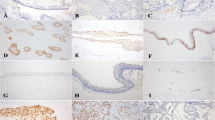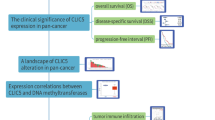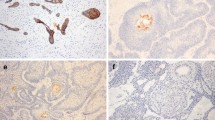Abstract
Background
Odontogenic lesions constitute a heterogeneous group of lesions. CLIC4 protein regulates different cellular processes, including epithelial-mesenchymal transition and fibroblast-myofibroblast transdifferentiation. This study analyzed CLIC4, E-cadherin, Vimentin, and α-SMA immunoexpression in epithelial odontogenic lesions that exhibit different biological behavior.
Methods
It analyzed the immunoexpression of CLIC4, E-cadherin, and Vimentin in the epithelial cells, as well as CLIC4 and α-SMA in the mesenchymal cells, of ameloblastoma (AM) (n = 16), odontogenic keratocyst (OKC) (n = 20), and adenomatoid odontogenic tumor (AOT) (n = 8). Immunoexpressions were categorized as score 0 (0% positive cells), 1 (< 25%), 2 (≥ 25% - < 50%), 3 (≥ 50% - < 75%), or 4 (≥ 75%).
Results
Cytoplasmic CLIC4 immunoexpression was higher in AM and AOT (p < 0.001) epithelial cells. Nuclear-cytoplasmic CLIC4 was higher in OKC’s epithelial lining (p < 0.001). Membrane (p = 0.012) and membrane-cytoplasmic (p < 0.001) E-cadherin immunoexpression were higher in OKC, while cytoplasmic E-cadherin expression was higher in AM and AOT (p < 0.001). Vimentin immunoexpression was higher in AM and AOT (p < 0.001). Stromal CLIC4 was higher in AM and OKC (p = 0.008). Similarly, α-SMA immunoexpression was higher in AM and OKC (p = 0.037). Correlations in these proteins’ immunoexpression were observed in AM and OKC (p < 0.05).
Conclusions
CLIC4 seems to regulate the epithelial-mesenchymal transition, modifying E-cadherin and Vimentin expression. In mesenchymal cells, CLIC4 may play a role in fibroblast-myofibroblast transdifferentiation. CLIC4 may be associated with epithelial odontogenic lesions with aggressive biological behavior.



Similar content being viewed by others
Explore related subjects
Discover the latest articles and news from researchers in related subjects, suggested using machine learning.Data Availability
The authors declare that the data supporting this study’s findings are available from the corresponding author upon reasonable request.
Code Availability
Not applicable.
References
Vered M, Wright JM (2022) Update from the 5th Edition of the World Health Organization Classification of Head and Neck tumors: odontogenic and maxillofacial bone tumours. Head Neck Pathol 16:63–75. https://doi.org/10.1007/s12105-021-01404-7
Santos PPDA, Nonaka CFW, Freitas RDA, Pereira Pinto L, Souza LBD (2017) Immunohistochemical analysis of myofibroblasts, TGF -β1, and IFN ‐γ in epithelial odontogenic lesions. J Oral Pathol Med 46:365–370. https://doi.org/10.1111/jop.12494
Mello FW, Melo G, Kammer PV, Speight PM, Rivero ERC (2019) Prevalence of odontogenic cysts and tumors associated with impacted third molars: a systematic review and meta-analysis. J Craniomaxillofac Surg 47:996–1002. https://doi.org/10.1016/j.jcms.2019.03.026
Shukla A, Yuspa SH (2010) CLIC4 and Schnurri2: a dynamic duo in TGFβ signaling with broader implications in cellular homeostasis and disease. Nucleus 1:1441–1449. https://doi.org/10.4161/nucl.1.2.10920
Yao Q, Qu X, Yang Q, Wei M, Kong B (2009) CLIC4 mediates TGF-beta1-induced fibroblast-to-myofibroblast transdifferentiation in ovarian cancer. Oncol Rep 22:541–548. https://doi.org/10.3892/or_00000469
Suh KS, Malik M, Shukla A et al (2012) CLIC4 is a tumor suppressor for cutaneous squamous cell cancer. Carcinogenesis 2012;33:986–995. https://doi.org/10.1093/carcin/bgs115
Shukla A, Edwards R, Yang Y et al (2014) CLIC4 regulates TGF-β-dependent myofibroblast differentiation to produce a cancer stroma. Oncogene 33:842–850. https://doi.org/10.1038/onc.2013.18
Gonzalez DM, Medici D (2014) Signaling mechanisms of the epithelial-mesenchymal transition. Sci Signal 7:re8. https://doi.org/10.1126/scisignal.2005189
Yoshida T, Ozawa Y, Kimura T et al (2014) Eribulin mesilate suppresses experimental metastasis of breast cancer cells by reversing phenotype from epithelial-mesenchymal transition (EMT) to mesenchymal-epithelial transition (MET) states. Br J Cancer 110:1497–1505. https://doi.org/10.1038/bjc.2014.80
Wang B, Zheng J, Chen Q et al (2020) CLIC4 abrogation promotes epithelial-mesenchymal transition in gastric cancer. Carcinogenesis 41:841–849. https://doi.org/10.1093/carcin/bgz156
Sasaki K, Natsugoe S, Ishigami S et al (2009) Significance of twist expression and its association with E-cadherin in esophageal squamous cell carcinoma. J Exp Clin Cancer Res 28:158. https://doi.org/10.1186/1756-9966-28-158
Gomes IP, Bastos VC, Guimarães LM, Gomes CC (2023) The molecular basis of odontogenic cysts and tumours. J Oral Pathol Med 52:351–356. https://doi.org/10.1111/jop.13401
Lima FJ, Lopes MLDDS, Barros CCDS et al (2020) Modification in CLIC4 expression is Associated with P53, TGF-β, TNF-α and myofibroblasts in Lip Carcinogenesis. Braz Dent J 31:290–297. https://doi.org/10.1590/0103-6440202003104
Xerez MC, Barros CCS, Queiroz SI et al (2023) The stromal immunoexpression of CLIC4 may be related to the difference in the biological behavior between oral squamous cell carcinoma and oral verrucous carcinoma. Med Oral Patol Oral Cir Bucal 28:e418–e424. https://doi.org/10.4317/medoral.25842
Suh KS, Crutchley JM, Koochek A et al (2007) Reciprocal modifications of CLIC4 in Tumor Epithelium and Stroma Mark Malignant progression of multiple human cancers. Clin Cancer Res 13:121–131. https://doi.org/10.1158/1078-0432.CCR-06-1562
Suh KS, Mutoh M, Mutoh T et al (2007) CLIC4 mediates and is required for Ca2+-induced keratinocyte differentiation. J Cell Sci 120:2631–2640. https://doi.org/10.1242/jcs.002741
Nakazawa M, Kyprianou N (2017) Epithelial-mesenchymal-transition regulators in prostate cancer: androgens and beyond. J Steroid Biochem Mol Biol 166:84–90. https://doi.org/10.1016/j.jsbmb.2016.05.007
Zang C, Liu X, Li B et al (2017) IL-6/STAT3/TWIST inhibition reverses ionizing radiation-induced EMT and radioresistance in esophageal squamous carcinoma. Oncotarget 8:11228–11238. https://doi.org/10.18632/oncotarget.14495
Dongre A, Weinberg RA (2019) New insights into the mechanisms of epithelial-mesenchymal transition and implications for cancer. Nat Rev Mol Cell Biol 20:69–84. https://doi.org/10.1038/s41580-018-0080-4
Corso G, Figueiredo J, De Angelis SP et al (2020) E-cadherin deregulation in breast cancer. J Cell Mol Med 24:5930–5936. https://doi.org/10.1111/jcmm.15140
Kaszak I, Witkowska-Piłaszewicz O, Niewiadomska Z et al (2020) Role of cadherins in Cancer-A Review. Int J Mol Sci 21:7624. https://doi.org/10.3390/ijms21207624
Hao F, Liu J, Zhong M, Wang J, Liu J (2018) Expression of E-cadherin, vimentin and β-catenin in ameloblastoma and association with clinicopathological characteristics of ameloblastoma. Int J Clin Exp Pathol 11:199–207
Zhong WQ, Chen G, Zhang W et al (2015) Epithelial-mesenchymal transition in keratocystic odontogenic tumor: possible role in locally aggressive behavior. Biomed Res Int 2015:168089. https://doi.org/10.1155/2015/168089
Zhang J, Wang Y, Fan C et al (2019) Interleukin-8/β-catenin mediates epithelial-mesenchymal transition in ameloblastoma. Oral Dis 25:1964–1971. https://doi.org/10.1111/odi.13173
Barnts K, Feng JQ, Qin C, Zhang H, Cheng YL (2022) Adenomatoid odontogenic tumor: evidence for a mixed odontogenic tumor. Oral Surg Oral Med Oral Pathol Oral Radiol 133:675–683. https://doi.org/10.1016/j.oooo.2021.11.005
Suh KS, Malik M, Shukla A, Yuspa SH (2007) CLIC4, skin homeostasis and cutaneous cancer: surprising connections. Mol Carcinog 46:599–604. https://doi.org/10.1002/mc.20324
Syamala D, Suresh R, Janardhanan M et al (2016) Immunohistochemical evaluation of myofibroblasts in odontogenic cysts and tumors: a comparative study. J Oral Maxillofac Pathol 20:208–213. https://doi.org/10.4103/0973-029X.185898
Funding
Not applicable.
Author information
Authors and Affiliations
Contributions
M.C.X., C.C.S.B., and M.R.S.M.: conceptualization, investigation, data curation, writing—original draft, review, and editing. R.P.M.: formal analysis, writing—review & editing. H.F.L.: investigation, writing—review & editing. É.J.D.S. and A.L.L.C.: conceptualization, supervision, writing—review & editing. All authors read and approved the manuscript.
Corresponding author
Ethics declarations
Ethics Approval
All procedures performed in this study followed the ethical standards of the institutional and/or national research committee and the 1964 Helsinki Declaration and its later amendments. This study was approved by the Committee of Ethics in Research of Universidade Federal do Rio Grande do Norte (Approval No. 6.046.877).
Informed Consent
For this type of study, formal consent is not required.
Conflict of Interest
The authors declare no conflicts of interest.
Additional information
Publisher’s Note
Springer Nature remains neutral with regard to jurisdictional claims in published maps and institutional affiliations.
Electronic Supplementary Material
Below is the link to the electronic supplementary material.
Rights and permissions
Springer Nature or its licensor (e.g. a society or other partner) holds exclusive rights to this article under a publishing agreement with the author(s) or other rightsholder(s); author self-archiving of the accepted manuscript version of this article is solely governed by the terms of such publishing agreement and applicable law.
About this article
Cite this article
Xerez, M.C., da Silva Barros, C.C., de Souto Medeiros, M.R. et al. CLIC4 Function in the Epithelial-Mesenchymal Transition of Epithelial Odontogenic Lesions. Head and Neck Pathol 18, 40 (2024). https://doi.org/10.1007/s12105-024-01646-1
Received:
Accepted:
Published:
DOI: https://doi.org/10.1007/s12105-024-01646-1




